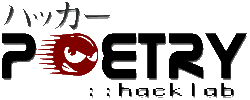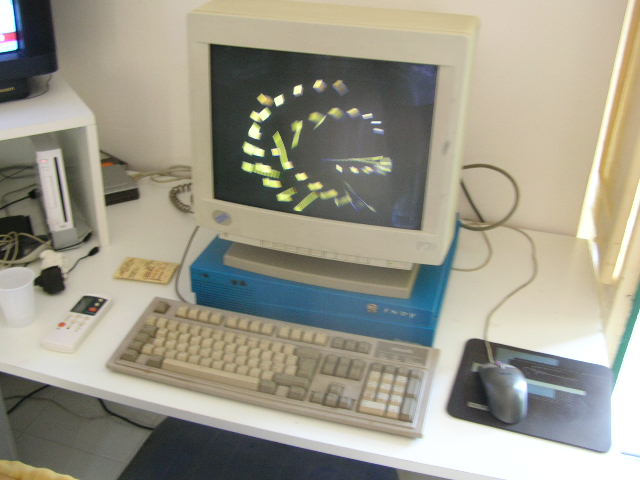I already posted about it here, but I’ll do so again in this thread. You may’ve guessed it… yes, the “[B]Deathrow[/B]” OpenVMS cluster!
I’m there practically every day and it’s one of my more favourite remote access systems. You’ll get free disk space, an associated e-mail address, personal web space, there’s a BBS-like (or better than BBS, if you ask me) system called DEC Notes and you’ll have a lot of OpenVMS Layered Products at your disposal, like the HP C/C++, Fortran, Java, etc. compilers. In other words, too much to mention.
It’s also a great opportunity to get acquainted with a VMS cluster system, DCL, DECnet (a nice change from TCP/IP) and so forth.
[CENTER] [/CENTER]
[/CENTER]
One of the sad things about “Deathrow” nowadays is that it’s mostly a single node system, so technically a cluster. The Alpha node (see the information below) [FONT=“Courier New”]GEIN::[/FONT] is one of my favourite nodes though, though I really miss the VAX (MicroVAX 3100/80) node [FONT=“Courier New”][URL=“http://deathrow.vistech.net/manson.shtml”]MANSON::[/FONT]. Lastly, below is some information about the [FONT=“Courier New”]GEIN::[/FONT] node, the most popular and widely available one for that matter.
[INDENT][FONT=“Courier New”]GEIN::[/FONT] is an AlphaServer DS10L, which is a single Alpha (AXP) processor-based 1U (19" RM) server system and it was originally manufactured and marketed by Compaq and licensees in the late 1990s, with the following hardware and software: [LIST][*]DEC Alpha EV6/21264 processor, clocked at 466 MHz with 2 MB cache
OpenVMS V7.3-1 on node GEIN 25-OCT-2011 15:51:42.06 Uptime 38 11:28:02
AlphaServer DS10L 466 MHz
System: GEIN, AlphaServer DS10L 466 MHz
CPU ownership sets:
Active 0
Configure 0
CPU state sets:
Potential 0
Autostart 0
Powered Down None
Not Present None
Failover None
SMP execlet = 3 : Disabled : Uniprocessing.
Config tree = None
Primary CPU = 0
HWRPB CPUs = 1
Page Size = 8192
Revision Code =
Serial Number = 1
Default CPU Capabilities:
System: QUORUM RUN
Default Process Capabilities:
System: QUORUM RUN
CPU 0 State: RUN CPUDB: 81430000 Handle: * None *
Process: EMGEE PID: 2022A562
Capabilities:
System: PRIMARY QUORUM RUN RAD0
Slot Context: 8427A180
CPU - State..........: RC, PA, PP, CV, PV, PMV, PL
Type...........: EV6 (21264), Pass 2.3
Speed..........: 462 Mhz
Variation......: VAX FP, IEEE FP, Primary Eligible
Serial Number..:
Revision.......:
Halt Request...: 0
Software Comp..: 0.0
PALCODE - Revision Code..: 1.98-01
Compatibility..: 83
Max Shared CPUs: 1
Memory Space..: Physical = 00000000.00000000 Length = 0
Scratch Space..: Physical = 00000000.00000000 Length = 0
Bindings: * None *
Fastpath: * None *
Features:
Autostart - Enabled.
Fastpath - Selection enabled as Preferred CPU.
[*]256 MB RAM
System Memory Resources on 25-OCT-2011 15:50:41.72
Physical Memory Usage (pages): Total Free In Use Modified
Main Memory (256.00MB) 32768 7891 23807 1070
Of the physical pages in use, 4468 pages are permanently allocated to OpenVMS.
[]dual DE500, on-board ‘Fast Ethernet’ (100BASE-TX), ethernet NICs
[]2× IDE/ATA internal disks, a Maxtor 53073H4 ([FONT=“Courier New”]DISK$GEIN_SYS[/FONT]) and a Seagate ST3120023A ([FONT=“Courier New”]DISK$GEIN_DATA[/FONT]), divided over several logical disk images (with the excellent LD driver)
Device Device Error Volume Free Trans Mnt
Name Status Count Label Blocks Count Cnt
$3$DQA0: (GEIN) Mounted 0 GEIN_SYS 20330457 595 1
$3$DQB1: (GEIN) Mounted 0 GEIN_DATA 126356175 10 1
$9$LDA1: (GEIN) Mounted 0 USERS 2147877 9 1
$9$LDA2: (GEIN) Mounted 0 EXTRA 256484 1 1
$9$LDA3: (GEIN) Mounted 0 FTP 2849517 1 1
$9$LDA4: (GEIN) Mounted 0 USERS_ODS5 2435643 1 1
[*]OpenVMS Alpha V7.3-1, along with many Layered Products (including C, C++, COBOL, BASIC, PASCAL, etc. compilers), DECwindows/Motif V1.2-6 and instead of the standard TCP/IP Services, Process Software MultiNet V5.0 rev. A-X
Active licenses on node GEIN:
------- Product ID -------- ---- Rating ----- -- Version --
Product Producer Units Avail Activ Version Release Termination
ACMS DEC 0 0 100 0.0 (none) 15-JUN-2012
ACMS-REM DEC 0 0 100 0.0 (none) 15-JUN-2012
ACMS-RT DEC 0 0 100 0.0 (none) 15-JUN-2012
ACMSXP-DEV DEC 0 0 100 0.0 (none) 15-JUN-2012
ACMSXP-RT DEC 0 0 100 0.0 (none) 15-JUN-2012
ADA DEC 0 0 100 0.0 (none) 15-JUN-2012
ADA-PDO DEC 0 0 100 0.0 (none) 15-JUN-2012
ALLIN1-MAIL-DW-CLI DEC 0 0 100 0.0 (none) 15-JUN-2012
ALLIN1-MAIL-SERVER DEC 0 0 100 0.0 (none) 15-JUN-2012
ALLIN1-MAIL-SERVER DEC 0 0 100 0.0 (none) 15-JUN-2012
ALLIN1-MAIL-VT-CLI DEC 0 0 100 0.0 (none) 15-JUN-2012
ALLIN1-MAIL-VT-USE DEC 0 0 100 0.0 (none) 15-JUN-2012
ALLIN1-MAIL-WAN-SE DEC 0 0 100 0.0 (none) 15-JUN-2012
BASIC DEC 0 0 100 0.0 (none) 15-JUN-2012
C DEC 0 0 100 0.0 (none) 15-JUN-2012
CMS DEC 0 0 100 0.0 (none) 15-JUN-2012
COBOL DEC 0 0 100 0.0 (none) 15-JUN-2012
CXX-V DEC 0 0 100 0.0 (none) 15-JUN-2012
DCE-APP-DEV DEC 0 0 100 0.0 (none) 15-JUN-2012
DCE-CDS DEC 0 0 100 0.0 (none) 15-JUN-2012
DCE-SECURITY DEC 0 0 100 0.0 (none) 15-JUN-2012
DCPS-OPEN DEC 0 0 100 0.0 (none) 15-JUN-2012
DCPS-PLUS DEC 0 0 100 0.0 (none) 15-JUN-2012
DECDCS-SRV-VA DEC 0 0 100 0.0 (none) 15-JUN-2012
DECMIGRATE DEC 0 0 100 0.0 (none) 15-JUN-2012
DECRAM DEC 0 0 100 0.0 (none) 15-JUN-2012
DECWRITE DEC 0 0 100 0.0 (none) 15-JUN-2012
DECWRITE-USER DEC 0 0 100 0.0 (none) 15-JUN-2012
DESKTOP-ACMS DEC 0 0 100 0.0 (none) 15-JUN-2012
DFG DEC 0 0 100 0.0 (none) 15-JUN-2012
DFS DEC 0 0 100 0.0 (none) 15-JUN-2012
DQS DEC 0 0 100 0.0 (none) 15-JUN-2012
DTM DEC 0 0 100 0.0 (none) 15-JUN-2012
DTR DEC 0 0 100 0.0 (none) 15-JUN-2012
DTR-UI-JAPANESE DEC 0 0 100 0.0 (none) 15-JUN-2012
DVNETEND DEC 0 0 100 0.0 (none) 15-JUN-2012
DVNETEXT DEC 0 0 100 0.0 (none) 15-JUN-2012
DVNETRTG DEC 0 0 100 0.0 (none) 15-JUN-2012
DW-MOTIF DEC 0 0 100 0.0 (none) 15-JUN-2012
DW-MOTIF-UI-CESKY DEC 0 0 100 0.0 (none) 15-JUN-2012
DW-MOTIF-UI-DEUTSC DEC 0 0 100 0.0 (none) 15-JUN-2012
DW-MOTIF-UI-ESPANO DEC 0 0 100 0.0 (none) 15-JUN-2012
DW-MOTIF-UI-FRANCA DEC 0 0 100 0.0 (none) 15-JUN-2012
DW-MOTIF-UI-HANGUL DEC 0 0 100 0.0 (none) 15-JUN-2012
DW-MOTIF-UI-HANYU DEC 0 0 100 0.0 (none) 15-JUN-2012
DW-MOTIF-UI-HANZI DEC 0 0 100 0.0 (none) 15-JUN-2012
DW-MOTIF-UI-HEBREW DEC 0 0 100 0.0 (none) 15-JUN-2012
DW-MOTIF-UI-ITALIA DEC 0 0 100 0.0 (none) 15-JUN-2012
DW-MOTIF-UI-JAPANE DEC 0 0 100 0.0 (none) 15-JUN-2012
DW-MOTIF-UI-MAGYAR DEC 0 0 100 0.0 (none) 15-JUN-2012
DW-MOTIF-UI-POLSKI DEC 0 0 100 0.0 (none) 15-JUN-2012
DW-MOTIF-UI-RUSSKI DEC 0 0 100 0.0 (none) 15-JUN-2012
DW-MOTIF-UI-SLOVEN DEC 0 0 100 0.0 (none) 15-JUN-2012
DW-MOTIF-UI-SVENSK DEC 0 0 100 0.0 (none) 15-JUN-2012
DW-SNA-3270-TE-VMS DEC 0 0 100 0.0 (none) 15-JUN-2012
EXT-MATH-LIB DEC 0 0 100 0.0 (none) 15-JUN-2012
EXT-MATH-LIB-RT DEC 0 0 100 0.0 (none) 15-JUN-2012
FMS DEC 0 0 100 0.0 (none) 15-JUN-2012
FMS-RT-UI-JAPANESE DEC 0 0 100 0.0 (none) 15-JUN-2012
FMS-UI-HANGUL DEC 0 0 100 0.0 (none) 15-JUN-2012
FMS-UI-JAPANESE DEC 0 0 100 0.0 (none) 15-JUN-2012
FORMS DEC 0 0 100 0.0 (none) 15-JUN-2012
FORMS-RT DEC 0 0 100 0.0 (none) 15-JUN-2012
FORMS-RT-UI-HANGUL DEC 0 0 100 0.0 (none) 15-JUN-2012
FORMS-RT-UI-HANYU DEC 0 0 100 0.0 (none) 15-JUN-2012
FORTRAN DEC 0 0 100 0.0 (none) 15-JUN-2012
GKS DEC 0 0 100 0.0 (none) 15-JUN-2012
GKS-RT DEC 0 0 100 0.0 (none) 15-JUN-2012
GKS-RT-UI-JAPANESE DEC 0 0 100 0.0 (none) 15-JUN-2012
GKS-UI-JAPANESE DEC 0 0 100 0.0 (none) 15-JUN-2012
GKS3D DEC 0 0 100 0.0 (none) 15-JUN-2012
GKS3D-RT DEC 0 0 100 0.0 (none) 15-JUN-2012
LSE DEC 0 0 100 0.0 (none) 15-JUN-2012
MACRO64 DEC 0 0 100 0.0 (none) 15-JUN-2012
MAILBUS-400-API DEC 0 0 100 0.0 (none) 15-JUN-2012
MAILBUS-400-MTA DEC 0 0 100 0.0 (none) 15-JUN-2012
MMOV-DV DEC 0 0 100 0.0 (none) 15-JUN-2012
MMOV-RT DEC 0 0 100 0.0 (none) 15-JUN-2012
MMS DEC 0 0 100 0.0 (none) 15-JUN-2012
NOTES DEC 0 0 100 0.0 (none) 15-JUN-2012
OPENVMS-ALPHA DEC 0 0 A 0.0 (none) 15-JUN-2012
OPENVMS-ALPHA-USER DEC 0 0 100 0.0 (none) 15-JUN-2012
OPENVMS-HOBBYIST DEC 0 0 100 0.0 (none) 15-JUN-2012
OPS5 DEC 0 0 100 0.0 (none) 15-JUN-2012
PASCAL DEC 0 0 100 0.0 (none) 15-JUN-2012
PCA DEC 0 0 100 0.0 (none) 15-JUN-2012
PHIGS DEC 0 0 100 0.0 (none) 15-JUN-2012
PHIGS-RUNTIME DEC 0 0 100 0.0 (none) 15-JUN-2012
PHIGS-RUNTIME-UI-J DEC 0 0 100 0.0 (none) 15-JUN-2012
PHIGS-UI-JAPANESE DEC 0 0 100 0.0 (none) 15-JUN-2012
RMSJNL DEC 0 0 100 0.0 (none) 15-JUN-2012
RTR-CL DEC 0 0 100 0.0 (none) 15-JUN-2012
RTR-SVR DEC 0 0 100 0.0 (none) 15-JUN-2012
SQL-DEV DEC 0 0 100 0.0 (none) 15-JUN-2012
SSU DEC 0 0 100 0.0 (none) 15-JUN-2012
UCX DEC 0 0 100 0.0 (none) 15-JUN-2012
UCX-IP-CLIENT DEC 0 0 100 0.0 (none) 15-JUN-2012
UCX-IP-NFS DEC 0 0 100 0.0 (none) 15-JUN-2012
UCX-IP-RT DEC 0 0 100 0.0 (none) 15-JUN-2012
VAXCLUSTER DEC 0 0 100 0.0 (none) 15-JUN-2012
VAXSET DEC 0 0 100 0.0 (none) 15-JUN-2012
VMS-UI-JAPANESE DEC 0 0 100 0.0 (none) 15-JUN-2012
VMSCLUSTER DEC 0 0 100 0.0 (none) 15-JUN-2012
VOLSHAD DEC 0 0 100 0.0 (none) 15-JUN-2012
X25 DEC 0 0 100 0.0 (none) 15-JUN-2012
X25-CLIENT DEC 0 0 100 0.0 (none) 15-JUN-2012
X500-ADMIN-FACILIT DEC 0 0 100 0.0 (none) 15-JUN-2012
X500-DIRECTORY-SER DEC 0 0 100 0.0 (none) 15-JUN-2012
AVAIL-MAN HP 0 0 100 0.0 (none) 15-JUN-2012
MULTINET TGV 0 0 100 0.0 (none) 18-JUN-2012
Process Software MultiNet V5.0 Rev A-X, AlphaServer DS10L 466 MHz,
OpenVMS AXP V7.3-1
[/LIST]
In case you’re curious, this is what a DS10L looks like: [/INDENT][CENTER]
[/CENTER]



 [/CENTER]
[/CENTER] [/CENTER]
[/CENTER]